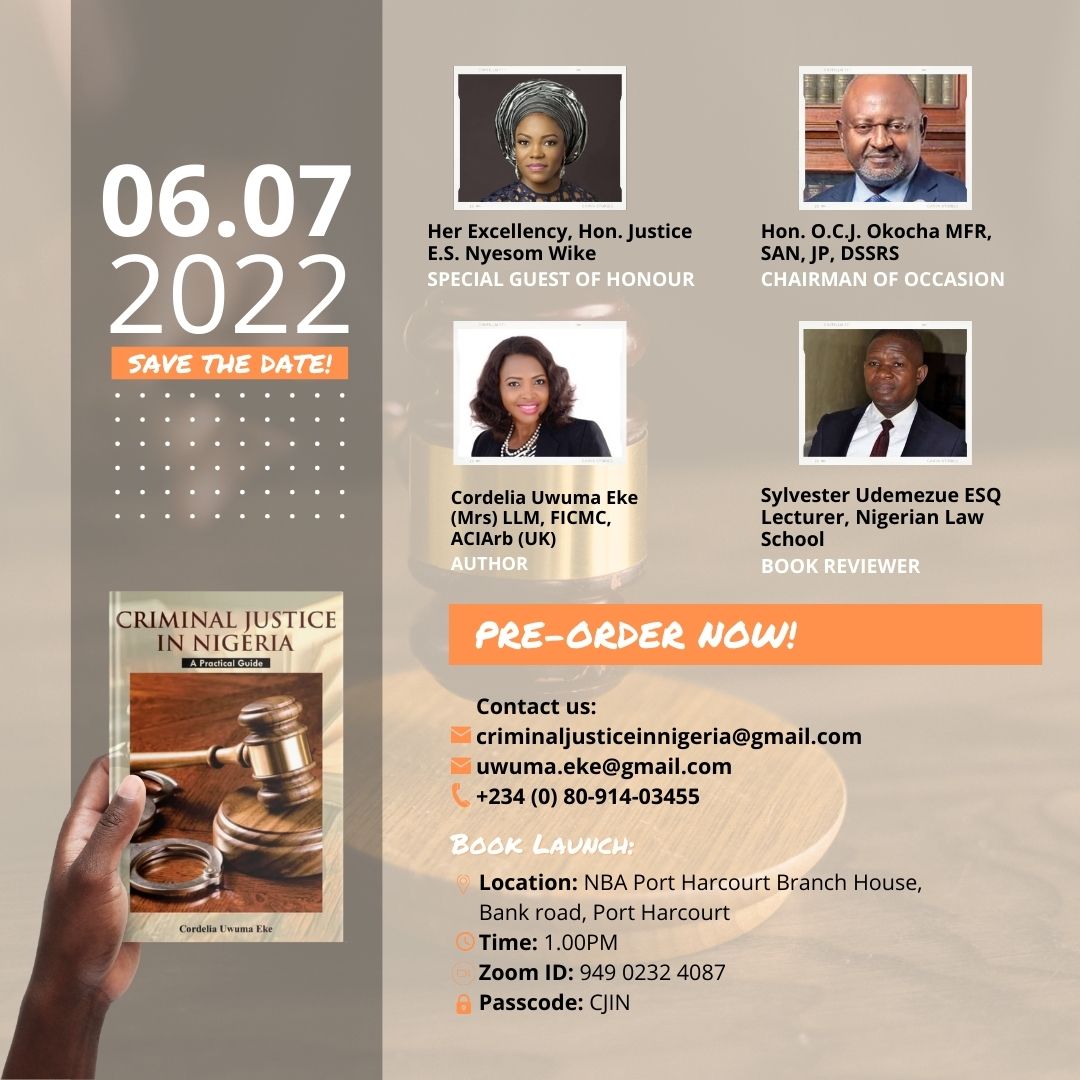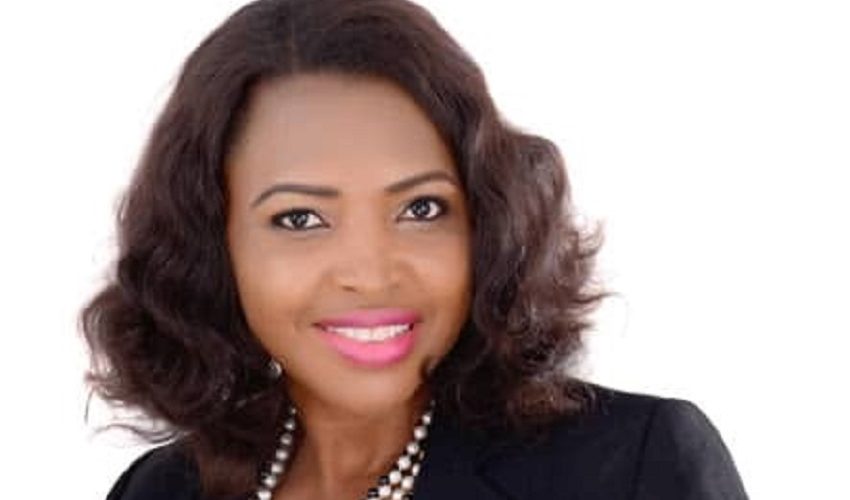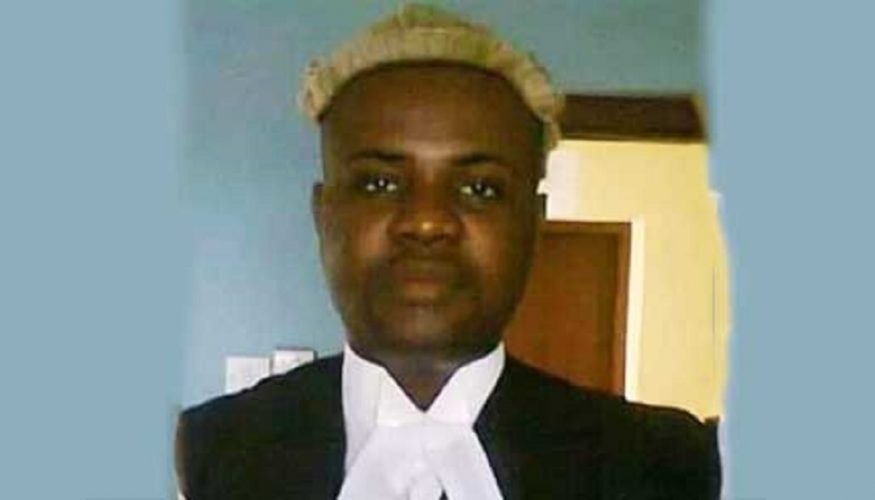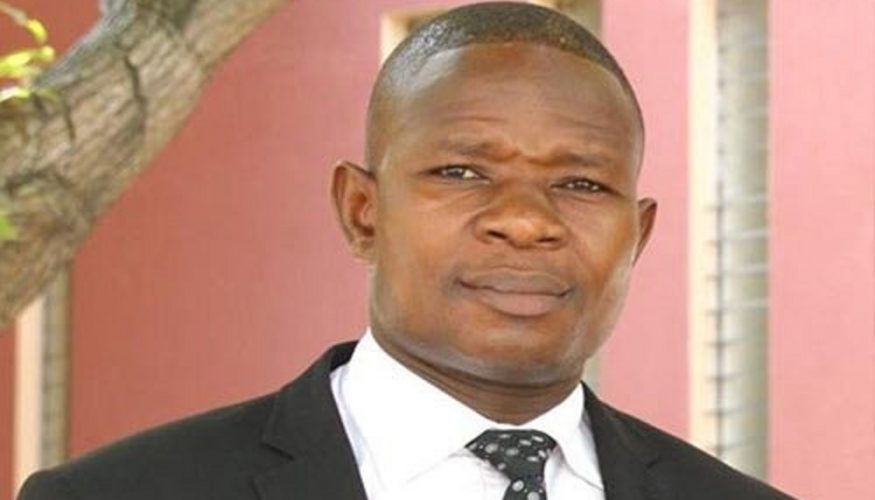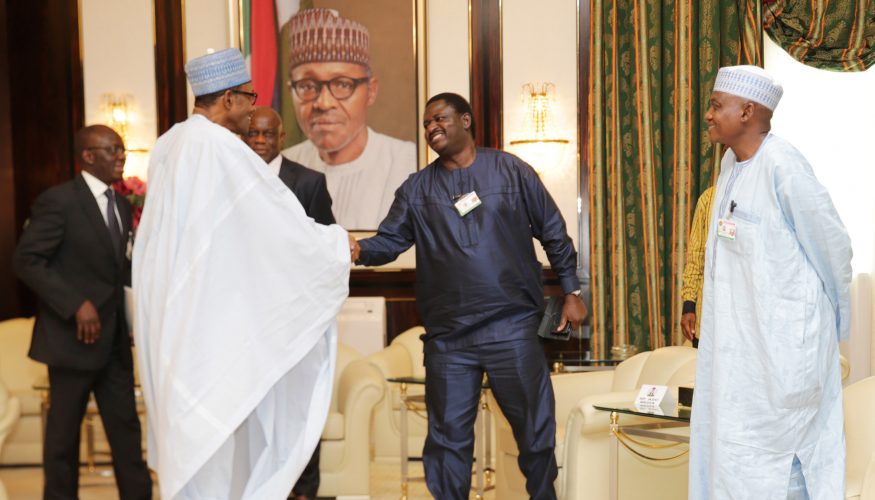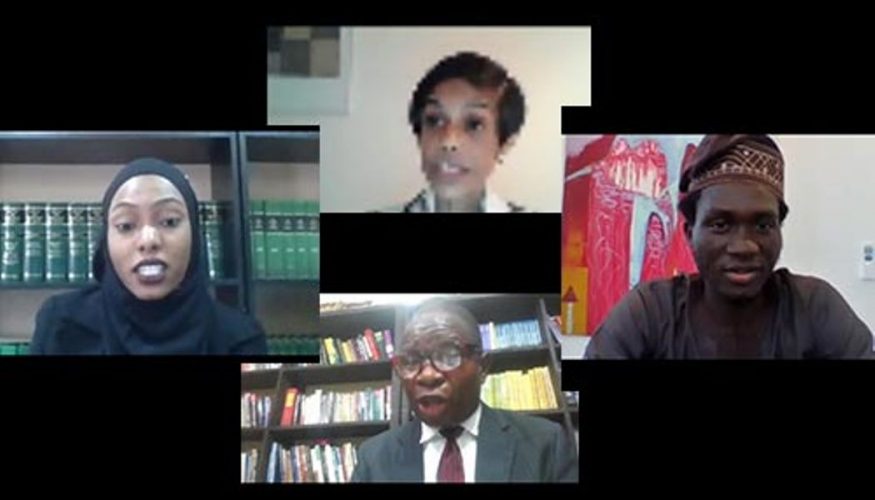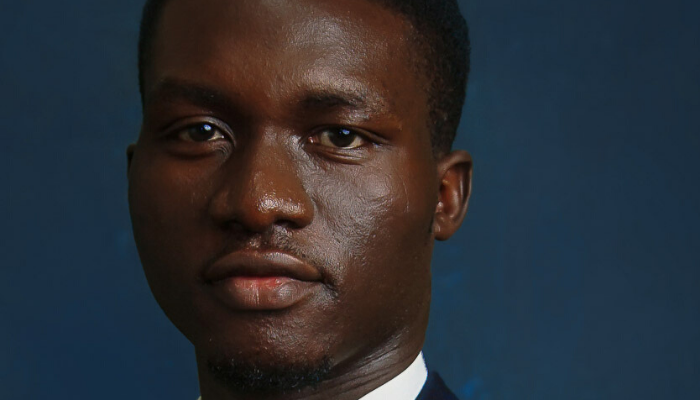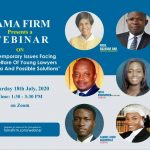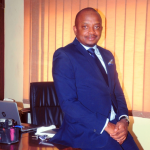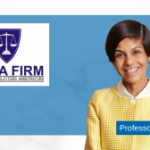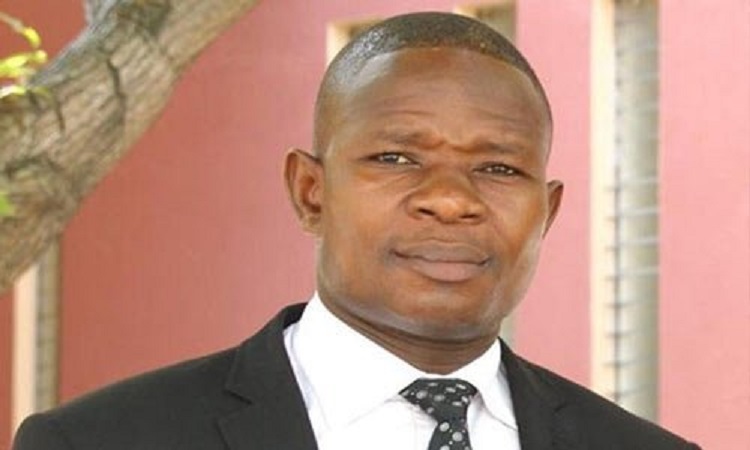WHETHER SECTION 8(8) OF THE NBA CONSTITUTION IS SELF-EXECUTING ON LOSS OF NBA-NEC MEMBERSHIP (PART 1)
By Sylvester Udemezue
INTRODUCTION
The present commentary represents my humble, personal opinion on whether or not provisions of section 8(8) of the Constitution of the Nigerian Bar Association (NBA), 2015 are self-executing.
MEANING OF “SELF-EXECUTING”
According to Cornel University’s Legal Information Institute, self-executing is used to refer to something or a provision that goes into effect or can be enforced after being created without anything else required. In an article titled, “Concept of Self-Executing Provisions”, published by projectjurisprudence, it is stated that a self-executing provision of a law is “a provision which is complete in itself and becomes operative without the aid of supplementary or enabling legislation, or that which supplies sufficient rule by means of which the right it grants may be enjoyed or protected”. Finally, a thing or provision of a law is said to be when it becomes “effective immediately without the need of intervening court action, ancillary legislation, or other type of implementing action” (see: https://law.jrank.org/pages/10130/Self-Executing.html#ixzz7TIgHIUFR)
MEETINGS OF NBA-NEC
Section 8 of the NBA Constitution, 2015 makes provisions for meetings of the National Executive council of the NBA (NBA-NEC). According to section 8 (2) and(4), “The National Executive Council shall meet at least once in a quarter…(4) The President may direct the General Secretary to convene an emergency meeting of the National Executive Council where the situation so demands”. Section 8(6) provides for powers of the NBA-NEC. Meanwhile, membership of the NBA-NEC for a certain period is mandatory for qualification for election into certain national offices of the NBA. Example, section 9(3) dealing with “Qualifications to hold a National Office”, provides:
“A member of the Association shall be qualified to hold a National Office if he/she: a. is a full member of the Association and has paid, as at the date of his/her nomination, his/her Practicing Fees and Branch Dues, as and when due, for three (3) consecutive years inclusive of the year of election; 10 b. with respect to the office of the President, 1st Vice President and General Secretary, is in private legal practice; c. has at any time prior to his/her nomination been a member of the National Executive Council or the Executive Committee of a Branch or Section or Forum as indicated hereunder: i. for contestants for the offices of President, Vice Presidents, and General Secretary – he/she shall have been a member of the National Executive Council for not less than two (2) years at the time of nomination…” (emphasis mine)
AIM OF STATUTORY INTERPRETATION
The main purpose of the statutory interpretation is to discover the intentions of the makers of the law. A basic guide towards this end is to assume that the legislature has said in the statute, exactly what it means, and also that it means exactly what it has said therein. Thus, to find the real intentions of the drafters of a statute, regard must be had to the context, subject-matter and object of the statutory provision in question. This is easily achieved “by carefully analyzing the whole scope and provisions of the statute or section relating to the word or phrase under consideration….all approaches to statutory interpretation start (if not necessarily end) with the language and structure of the statute itself. This is because the language and provisions of a statute are the most reliable indicator of the intent of the makers of the statute”. (Udemezue S.C., “Place of Internal and External Aids to Statutory Interpretation in the Light of Legitimateness of Jurisdictive Discretion” (2021) 5 IMSU Journal of International Law and Jurisprudence (IJILJ) 48 (Imo State University). https://www.semanticscholar.org/paper/Role-of-Internal-and-External-Aids-in-Statutory-A-Udemezue/2a1cb4f1f872da82140420cc0a308d65f5900d57)
INTERPRETATION AND IMPLICATIONS OF S. 8(8) OF THE NBA CONSTITUTION.
Section 8(8) (formerly Section 7(7)) of the NBA Constitution, 2015 provides that “Any member who is absent from three (3) consecutive meetings of the National Executive Committee shall cease to be a member of the National Executive Committee unless he/she shows reasonable cause for such absence to the satisfaction of the National Executive Council.” In my opinion, the necessary implications of section 8(8) of the NBA Constitution is as follows:
1) A Lawyer who is appointed a NEC member and who is absent at NEC meetings on three consecutive occasions, loses his membership of NEC unless there exists a “reasonable cause” for such an absence to the satisfaction of the NEC. I doubt there is any provision for the NEC to institute any hearing at which the said lawyer is expected to make representations for the purposes of determining whether or not the absence is with or without a reasonable cause. I think it is the obligation of the lawyer who knows he’d not be present at a NEC meeting, or who has failed to attend a NEC meeting, to write the NEC and explain why he was going to away or why he stayed away from the meeting. This is in the nature of an application to have his absence excused. Accordingly, if there any evidence that a Lawyer now being accused of having stated away on three consecutive occasions, had written a letter to NEC on any (or all) of such occasions of his absence, either to ask the NEC to excuse his absence or thereafter, to explain his absence, and NEC had then accepted his explanation as satisfactory or a “reasonable cause” for his absence, then the NEC membership of the affected lawyer is saved. Thus, where the lawyer had written the NEC to explain his absence at any NEC meeting or meetings and the NEC had considered such application satisfactory, the implication is that the affected meeting or meetings cannot be relied upon, considered or counted for the purpose of considering whether the NEC membership seat of the affected lawyer had/has become vacant.
2) I respectfully submit that there is no condition requiring that the NEC must (by a resolution or other independent decision) declare such NEC member’s seat vacant before the provisions of section 8(8) would apply. Assuming there exists (although I am yet to see such anywhere) a requirement for the NEC to sit and pass a resolution declaring the seat of such a member vacant, failure of the NEC to sit and so declare does not adversely affect the vacancy of the seat of a member who has absented himself from three consecutive NEC meetings without a satisfactory reasonable cause shown to the NEC. In other words, in my humble opinion, his seat becoming vacant is self-executing, automatic provided the following three CONDITIONS are present:
a) He absented himself from NEC meeting on at least three consecutive occasions;
b) He either didn’t write the NEC to give “reasonable cause” for his absence at such proposed or past meeting(s) or he had actually written to the NEC, but the NEC had considered such explanation unsatisfactory.
3) It is further submitted that it’s unreasonable to argue or expect that NEC had any obligation (after each meeting or after three meetings at which a member was absent) to write to inquire of the affected member on why he failed to attend a NEC meeting or meetings. NEC’s obligation starts and ends with inviting its qualified members to every NEC meeting. An invitation to a NEC meeting is a letter. A member who receives a Letter of Invitation to a NEC meeting has three options: (a) Attend the the meeting; or (b) If you can’t attend, send your apologies giving reasonable cause (this is a reply to NEC’s Letter of Invitation); or (c) After the affected NEC meeting to write the NEC, to explain (I) why he couldn’t come and (ii) why he couldn’t/didn’t reply (i.e., send his apologies) before the NEC Meeting. This is akin to an applicant for an extension of time in usual civil court proceedings, by a party who apart from apologizing for late filing, has an ADDED responsibility to adduce credible reasons (reasonable cause) why he ailed to file within time.
4) Note, it is my further submission that it’s after NEC’s receipt or a letter (REPLY to notice of meeting) from the absentee-member, that NEC’s obligation arises to now write the affected NEC member to either say (I) we accept your explanation as satisfactory or (II) we reject your explanation as unsatisfactory. Where the NEC declares such an explanation unsatisfactory, the affected meeting becomes eligible to count or be counted as one meeting not attended by the affected NEC member and in respect of which his absence is not excused — not excused because (a) he sent no apologies or (b) sent one which was considered unsatisfactory.
5) It is respectfully submitted that the argument that NEC has an obligation to institute some form of hearing for a member who is absent at the NEC meeting on any occasion or on three consecutive occasions, has two grave implications:
a) May set a very poor precedent; may encourage some NEC members to stay away from NEC meetings, expecting that the NEC must write them after the meeting to ask “why were you absent”:
b) With due respect, it is not only disrespectful to expect the NEC to go about writing a member to inquire why the member was absent at a NEC meeting (for which he was duly invited) or at three consecutive meetings of the NEC. For God’s sake, how can one reasonably argue that a NEC member who (I) absents himself from a NEC meeting and also (II) failed/neglected/refused to send to the NEC (either before or after the meeting) an apology letter to explain his absence or to ask that his absence be excused, is still entitled to a second letter from the NEC asking him to explain why the disciplinary action of declaring his seat vacant, should not apply (or be applied)? Such a line of argument is perplexing, for three reasons:
i. It negates the universal practice and procedure of meetings, which places a responsibility on a member on whom a Notice of Meeting has been served, to either be present or send his apologies;
ii. Where the rule of the meeting of an organisation provides for sanctions to be imposed against a any member of the organisation for failure (without reasonable cause) to attend a meeting of the organisation, such sanctions usually apply against any member once two conditions are met — (a) the member failed to attend and (b) the member failed/neglected/refused to send satisfactory apologies/explanation.
iii. It may be, or not, disrespectful for a member for stay away from the meeting of an organisation; but is (more) disrespectful for such a member staying away to do so without any letter/notice of apologies sent to the organisation to explain his absence; and outright insulting for the affected member (or, indeed anyone else) to now turn around and expect the organisation (the organisation whose Notice he had ignored by its member) to still come writing the member to demand an explanation (reasonable cause) for the member’s failure to attend and for the member’s failure to extend some courtesy to the organisation by replying the Notice of Meeting earlier served on the member by the organisation. Note that failure to reply the Notice of Meeting when the member knew the member would not attend means the member has ignored the Notice of Meeting which is tantamount to also ignoring and treating the organisation with contempt.
6) In my humble opinion, section 8(8) of the NBA Constitution appears to impose a Volenti Non Fit Injuria Rule which operates automatically without any (further) action required on the part of anyone, once the necessary preconditions (as I have explained above) are present. The section is a warning to NEC members that, “Beware, if you stay absent at the NEC meeting on three consecutive occasions (without giving to the NEC, a satisfactory explanation of your absence), you automatically lose your NEC membership and thenceforth ceases to be a NEC member”. The implication of this, it is respectfully submitted, is that, where credible evidence is presented to establish that a particular lawyer has lost his NEC membership/seat by virtue of the provisions of section 8(8) of the NBA Constitution following his absence, without satisfactory explanation, at three consecutive meetings of the NEC, the burden automatically shifts on the affected lawyer to, by way of defence, present evidence to show either that (contrary to the allegation) he did not absent himself from the NEC meeting on three consecutive occasions or that even though he absented himself on three occasions as alleged, he cannot be said to have lost his NEC membership because he had, in a letter to the NEC (either before or after the/each meeting, in response to the Notice of meeting) satisfactorily explained his said absence. Satisfactory explanation, or “reasonable cause”, in my views, based on the aforesaid, means explanation which the NEC had (upon receipt of such explanation, considered acceptable or reasonable enough to justify excusing the absence of the affected lawyer). With due respect, it could be viewed as laughable for the affected lawyer to offer such ridiculous defence as, “See guys, I could not be said to have lost my seat because, although I was not present at three consecutive meetings, the NEC never invited me for a hearing to know why I did not attend neither did the NEC ever send me a letter asking that I should explain (giver reasonable cause for) my absence. If the NEC had asked me to explain, I would have explained satisfactorily. Since the NEC did not write me to explain, my membership of the NEC remains intact”. It is submitted that this sort of argument attracts three big questions unsatisfactory answers to any of which could push the argument to fall like a pack of cards:
a) Did the NEC not give you a Notice of meeting?
b) If yes, why did you not reply to notify the NEC of your absence?
c) Has the service of the Notice of Meeting on you not given you sufficient opportunity to to respond to it, asking the NEC to excuse your absence, since you would not attend?
7) If the seat of a NEC member becomes vacant by virtue of a provision of the NBA Constitution, the mere fact that the NEC, unaware that his office has become vacant, continues to send him Notice of subsequent NEC meetings, does not reverse, mitigate or displace the effect of the constitutional provision rendering his seat vacant upon the happening of the mandatory contingencies. Thus, where a member of the NEC fails (without reasonable cause shown by him, previously or subsequently) to attend the NEC meeting on three consecutive occasions, the said NEC member, according to the Constitution, loses his NEC seat. Any subsequent notice of meeting sent to such a person (who in the eyes of the Constitution has already lost his NEC seat) is as good as a Notice sent to a non-member of the NEC. Giving Notice to a non member of the organisation does not transform such a non member into a member of the organisation. It is submitted that a non member remains a non-member even if the organisation gives him/her a Notice of its meeting. Further, the NBA Constitution stipulates the conditions precedent to becoming a member of the NBA NEC, and the circumstances that may lead to a member losing his NEC membership/seat. When once any of such circumstances happens, the said member loses his membership. Such lost membership is not retrieved nor revived by the NEC innocently/mistakenly/inadvertently sending subsequent Notices of meeting to such a former member. Besides, there appears to be no provision in the NBA Constitution that a lawyer who has lost his membership of the NEC following his failure to attend the NEC meeting on three consecutive occasions, would have his membership revived if the NEC serves Notices of subsequent NEC meetings on him or if he attends any such subsequent NEC meetings or even continues to attend NEC meetings coming after the operation of the Constitution. The NBA Constitution has said what it means and meant what it has said.
8) What is the purpose of a Notice of meetings? According to section 245(1) of Companies and Allied matters Act (CAMA), 2020, failure to give notice of any company meeting to a person entitled to receive it, invalidates the meeting unless such failure is an accidental omission on the part of the person giving the notice. Section 242(1) CAMA, 2020 then provides that “The notice of a meeting shall specify the place, date and time of the meeting, and the general nature of the business to be transacted in sufficient detail to enable those to whom it is given to decide whether to attend or not…”. (emphasis mine). One crucial purpose or function of a Notice of Meeting is given in section 242(1) above: “to enable those to whom [the Notice] is given to decide whether to attend or not”. Where they decide to attend, a further decision is whether to attend personally or by proxy (see section 242(4) CAMA, 2020). Where on the other hand the member on whom the Notice is served/given decides to not attend or knows he would be unable to attend, he is under an obligation to notify the organisation of his (planned) absence and the reasons therefor. Where he sends a letter (of apology) to the organisation, it is now left for the organisation to consider his apologies and decide whether it is satisfactory or unsatisfactory. Where the Company considers his explanation satisfactory, the affected member may no longer suffer the punishment set aside for such non attendance.
9) Further, it may be relevant to also consider the effect of the portion of the usual Minutes of Meeting known as “Apologies”. This segment of the Minutes is meant to accommodate (letters of) apologies sent by members who, upon receipt of the Notice of the meeting, and aware they would not attend (for whatever reasons) have written to the Secretariat of the meeting (1) to notify the secretariat of their absence at the meeting, (b) to offer cogent reasons for such absence, (c) to offer an apology for their inability to be present, as expected, and (d) to plead that their said absence be excused based on the reasons offered, which they believe are cogent (ie, satisfactory). Note that the meeting could reject the reasons offered by such a member who failed to attend. Where the reasons offered are rejected, the implication is that the reasons are considered “not satisfactory”. If accepted, the effect is that the organisation has considered the reasons “satisfactory”, a reasonable cause. All in all, two things are clear: (I) A member of an organisation who is invited for a meeting of the organisation, but who knows (s)he would not or could not attend the meeting, has an obligation to notify the organisation, either before or after the meeting, to apologize and ask that his absence be excused. In my opinion, it sounds absurd for a member invited for a meeting to sit back at home and expect that after the meeting, the meeting should send him a second letter requesting him to explain, or give “reasonable cause” for, his absence at the meeting, before any set consequences of his failure to attend the meeting would apply. Generally, it is my submission that the rules applicable to absenteeism, will apply to all who after due receipt of the notice of the affected meeting, stayed away without any (satisfactory) apology letters sent to the organisation concerned. Accordingly, it is submitted that the provision of section 8(8) of the NBA Constitution has toed this line when is provides that a member of the NEC who fails to attend the NEC meeting on three consecutive occasions, loses his/her NEC membership unless he has offered a satisfactory explanation for his absenteeism. The provisions therefore appear more self-executing than otherwise. Writing under the title, “How to Apologize for Missing a Meeting”, Wood et all (the Editors of UpCountry) have given the following tips on what to do in such a situation. They state:
You should write a letter or email and begin with an honesty apology and use phrases like “I apologize for missing the meeting” or “I express regret over not being able to attend.” Do not make excuses or give an insincere explanation and ensure you communicate that you genuinely feel sorry (read more at: https://upjourney.com/how-to-apologize-for-missing-a-meeting)
Similarly, while listing the “Apologies” column as an essential component of a standard minutes of meeting, The Resource Centre explain that the column should contain: “a record of people who haven’t been able to come to the meeting, but have let the meeting know that they won’t be there”. (See: “Quick and easy guide to taking minutes”
https://www.resourcecentre.org.uk/information/taking-minutes/). On the its part, in a release titled “Governance: How to take and write minutes”, the University of Western Australia suggests that a “standard format for the preparation of minutes template” provides the correct layout of attendances and apologies in the minutes of a meeting, as follows:
“Record any apologies received in advance of the meeting, and advise the Chair of these before the meeting starts. Record attendees either by ticking them off against the list of members on your agenda, or on an attendance list. Be careful about this relatively easy task – members can be very sensitive about being left off the list of attendees, and about their titles and names being absolutely right! Record the names of any invitees to the meeting and indicate which item/s they attended for”. ( See: https://www.governance.uwa.edu.au/committees/principles/meetings/preparation/minutes)
Finally on this part, an organisation that goes by the name “What Makes a Good Leader” appears to have recognized that making/sending a letter of apologies when you know you would not be able to attend the meeting of an organization of which you are a member, is an important quality of a good leader and good leadership. The organization explains that “Apologies are notifications from meeting participants indicating that they are unable to attend the meeting”. (see: Effective Meetings: Recording Meeting Minutes” by Ian Pratt (http://www.whatmakesagoodleader.com/meeting-minutes.html#:~:text=Apologies%20are%20notifications%20from%20meeting,unable%20to%20attend%20the%20meeting.). In recognition of the duty of a participant to apologize for not being able to attend a meeting or for missing a meeting, so many organisations and platforms now provide lecture notes, and organize training exercises, and tutorials and specimen letters bothering on how to apologize for missing or being late to a meeting. Some examples of such organisations/platforms include the Harvard Business Review, English Live, Career Ride, Letters Pro, and Up Journey. The point I have tried to make here is that a member of an organisation who, after having received a Notice of a meeting of the organisation, failed to attend same and failed to send his/her apology letter to the orgnanisation should be prepared to accept in good faith the necessary consequences of his deliberate actions. Aristotle made this clear when he posited that that “we are responsible for our voluntary actions… whereas for our involuntary actions we may be liable to either pardon or pity”. Thus, by virtue of section 8(8) of the NBA Constitution, 2015, an NBA-NEC member’s omission (1) to attend the NEC meeting, if such omission continues for three consecutive meetings and is accompanied by (2) the member’s omission to give reasonable cause for the omission to attend, are omissions which both combine to render the affected member’s NBA-NEC seat terminated/vacant. I so submit with due respect.
Long live the NBA!
Respectfully,
Sylvester Udemezue (udems)
08109024556, udemsyl@gmail.com.
(14 May 2022)
